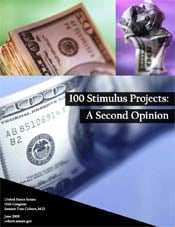 This morning's stimulus roundup:
This morning's stimulus roundup:
* Just hours after Sen. Tom Coburn, R-Okla., put out his report, “A Second Opinion on the Stimulus,” detailing 100 "questionable" stimulus projects, the Obama administration fired back, issuing "A Second Look at The Second Opinion." The administration argues that Coburn's report is "riddled with falsehoods, outdated information, and misleading assertions." Of the 100 projects on Coburn's list, the administration said 20 percent are misleading. It acknowledged that 40 percent are "still under review." The administration relayed to the New York Times that the “under review” tag did not signify that something was definitely amiss with the project or that funds had been misused." Coburn's staff is now reviewing the review. Perhaps they’ll call it “A Second Look at the Second Look at A Second Opinion.”
* Virginia is finally submitting its final list of transportation projects to the federal Department of Transportation for approval, reports the Washington Post. Why is "a state that has struggled for years to find road and transit money" the last to ask for funding? Since Virginia hasn't had funds for transportation projects, reporter Anita Kumar explains, it didn't have ongoing projects it could invest in. Interviews conducted by more than 20 members of ProPublica's Reporting Network found that the fastest and easiest way for states to obligate funds is to pick projects from existing backlogs. New projects must be designed -- and sometimes haggled over by environmental commissions or negotiated in court. The public affairs director for Oregon's DOT, Dave Thompson, tells ProPublica that the projects receiving stimulus funding in his state were "planned on anyway." Adan Carillo, a spokesman for Utah's DOT, tells a similar story: "The stimulus money basically helped us fast-track a lot of our maintenance projects."
* Currently, stimulus funds spent on transit must be used for capital construction and maintenance projects, not on operating costs like stabilizing fares or preventing layoffs. But last night, the House of Representatives approved legislation permitting transit agencies to shift as much as 10 percent of their stimulus funds to their operating budgets. A Senate vote is expected tomorrow, reports the New York Daily News.
* Chicago Public Radio reports that only two of 200 state stimulus-funded transportation projects in Chicago went to Chicago companies.
* There's widespread deliberation among officials in North Providence, R.I., about whether its mayor can use stimulus funds to help cover its June 12 payroll.



